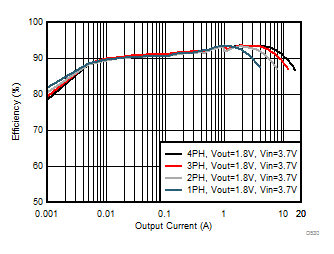ZHCSHY8 March 2018 LP87561-Q1 , LP87562-Q1 , LP87563-Q1 , LP87564-Q1 , LP87565-Q1
PRODUCTION DATA.
- 1 特性
- 2 应用
- 3 说明
- 4 修订历史记录
- 5 Device Comparison Table
- 6 Pin Configuration and Functions
- 7 Specifications
-
8 Detailed Description
- 8.1 Overview
- 8.2 Functional Block Diagram
- 8.3
Feature Descriptions
- 8.3.1 Multi-Phase DC/DC Converters
- 8.3.2 Sync Clock Functionality
- 8.3.3 Power-Up
- 8.3.4 Regulator Control
- 8.3.5 Enable and Disable Sequences
- 8.3.6 Device Reset Scenarios
- 8.3.7 Diagnosis and Protection Features
- 8.3.8 GPIO Signal Operation
- 8.3.9 Digital Signal Filtering
- 8.4 Device Functional Modes
- 8.5 Programming
- 8.6
Register Maps
- 8.6.1
Register Descriptions
- 8.6.1.1 OTP_REV
- 8.6.1.2 BUCK0_CTRL1
- 8.6.1.3 BUCK0_CTRL2
- 8.6.1.4 BUCK1_CTRL1
- 8.6.1.5 BUCK1_CTRL2
- 8.6.1.6 BUCK2_CTRL1
- 8.6.1.7 BUCK2_CTRL2
- 8.6.1.8 BUCK3_CTRL1
- 8.6.1.9 BUCK3_CTRL2
- 8.6.1.10 BUCK0_VOUT
- 8.6.1.11 BUCK0_FLOOR_VOUT
- 8.6.1.12 BUCK1_VOUT
- 8.6.1.13 BUCK1_FLOOR_VOUT
- 8.6.1.14 BUCK2_VOUT
- 8.6.1.15 BUCK2_FLOOR_VOUT
- 8.6.1.16 BUCK3_VOUT
- 8.6.1.17 BUCK3_FLOOR_VOUT
- 8.6.1.18 BUCK0_DELAY
- 8.6.1.19 BUCK1_DELAY
- 8.6.1.20 BUCK2_DELAY
- 8.6.1.21 BUCK3_DELAY
- 8.6.1.22 GPIO2_DELAY
- 8.6.1.23 GPIO3_DELAY
- 8.6.1.24 RESET
- 8.6.1.25 CONFIG
- 8.6.1.26 INT_TOP1
- 8.6.1.27 INT_TOP2
- 8.6.1.28 INT_BUCK_0_1
- 8.6.1.29 INT_BUCK_2_3
- 8.6.1.30 TOP_STAT
- 8.6.1.31 BUCK_0_1_STAT
- 8.6.1.32 BUCK_2_3_STAT
- 8.6.1.33 TOP_MASK1
- 8.6.1.34 TOP_MASK2
- 8.6.1.35 BUCK_0_1_MASK
- 8.6.1.36 BUCK_2_3_MASK
- 8.6.1.37 SEL_I_LOAD
- 8.6.1.38 I_LOAD_2
- 8.6.1.39 I_LOAD_1
- 8.6.1.40 PGOOD_CTRL1
- 8.6.1.41 PGOOD_CTRL2
- 8.6.1.42 PGOOD_FLT
- 8.6.1.43 PLL_CTRL
- 8.6.1.44 PIN_FUNCTION
- 8.6.1.45 GPIO_CONFIG
- 8.6.1.46 GPIO_IN
- 8.6.1.47 GPIO_OUT
- 8.6.1
Register Descriptions
- 9 Application and Implementation
- 10Power Supply Recommendations
- 11Layout
- 12器件和文档支持
- 13"机械、封装和可订购信息
3 说明
LP8756x-Q1 器件专为满足各种汽车电源 应用中最新处理器和平台的电源管理要求而设计。该器件包含四个降压直流/直流转换器内核,这些内核可配置为 1 个四相输出、1 个三相和 1 个单相输出、2 个两相输出、1 个两相和 2 个单相输出,或者 4 个单相输出。该器件由 I2C 兼容串行接口和使能信号进行控制。
自动脉宽调制 (PWM) 到脉频调制 (PFM) 操作(AUTO 模式)与自动增相和切相相结合,可在较宽输出电流范围内最大限度地提高效率。LP8756x-Q1 支持对多相位输出的远程差分电压检测,可补偿稳压器输出与负载点 (POL) 之间的 IR 压降,从而提高输出电压的精度。此外,可以强制开关时钟进入 PWM 模式以及将其与外部时钟同步,从而最大限度地降低干扰。
LP8756x-Q1 器件支持在不添加外部电流检测电阻器的情况下进行负载电流测量。该器件还支持与使能信号同步的可编程启动与关断延迟和序列。这些序列可能包括用于控制外部稳压器、负载开关和处理器复位的 GPIO 信号。在启动和电压变化期间,该器件会对输出压摆率进行控制,从而最大限度地减小输出电压过冲和浪涌电流。
器件信息(1)
| 器件型号 | 封装 | 封装尺寸(标称值) |
|---|---|---|
| LP87561-Q1 | VQFN-HR (26) | 4.50mm × 4.00mm |
| LP87562-Q1 | ||
| LP87563-Q1 | ||
| LP87564-Q1 | ||
| LP87565-Q1 |
- 如需了解所有可用封装,请参阅数据表末尾的可订购米6体育平台手机版_好二三四附录。
效率与输出电流间的关系
